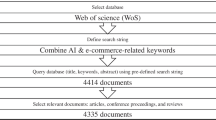Abstract
While e-commerce has grown rapidly in recent years, some of the practices associated with certain aspects of marketing on the Internet, such as pop-ups, cookies, and spam, have raised concerns on the part of Internet users. In this paper I examine the nature of these practices and what I take to be the underlying source of this concern. I argue that the ethical issues surrounding these Internet marketing techniques move us beyond the traditional treatment of the ethics of marketing and advertising found in discussions of business ethics previously. Rather, I show that the questions they raise ultimately turn upon questions of technique and the ways in which technologies can transform the fundamental means by which relationships are established and maintained within a social environment. I then argue that the techniques of e-commerce are indeed transforming the means by which businesses relate to consumers, and that this transformation is affecting the applicability of our previous ways of demarcating the imperatives determining the limits of accessibility between consumers and businesses. Properly addressing the ethical status of the techniques of e-marketing as such necessarily moves us to consider the changes that Internet commerce are having upon the norms that govern individuals in their relations with others.
Similar content being viewed by others
References
T. Beauchamp N. Bowie (2004) Ethical Theory and Business EditionNumber7 Prentice Hall Upper Saddle River
Bennett C. (2001) ArticleTitle‘Cookies, Web Bugs, Webcams, and Cue Cats: Patterns of Surveillance on the World Wide Web’ Ethics and Information Technology 3 IssueID3 197–210 Occurrence Handle10.1023/A:1012235815384
Buss S. (2002). ‘Personal Autonomy’, in E. Zalta (ed.), The Stanford Encyclopedia of Philosophy, http://plato.stanford. edu/archives/win2002/entries/personal-autonomy/
T. Donaldson P. Werhane (1999) Ethical Issues in Business: A Philosophical Approach EditionNumber6 Prentice Hall Upper Saddle River, NJ
Hafner, K. (2003), ‘A Change of Habits To Elude Spam’s Pull’, The New York Times (October 23)
W. Hoffman R. Frederick M. Schwartz (2001) Business Ethics: Readings and Cases in Corporate Morality EditionNumber4 McGraw Hill Boston, MA
M.D. Maury D. Kleiner (2002) ArticleTitle‘E-Commerce, Ethical Commerce?’ Journal of Business Ethics 36 IssueID1–2 21–31
L. May (1980) ArticleTitle‘Privacy and Property’ Philosophy in Context 10 40–53
D. Newman (2001) ArticleTitle‘Impersonal Interaction and Ethics on the World-Wide-Web’ Ethics and Information Technology 3 IssueID3 239–246
T. Radin (2001) ArticleTitle‘The Privacy Paradox: E-Commerce and Personal Information on the Internet’ Business and Professional Ethics Journal 20 IssueID3–4 145–170
W. Shaw V. Barry (2001) Moral Issues in Business EditionNumber8 Wadsworth Belmont, CA
R.A. Spinello (1999) ArticleTitle‘Ethical Reflections on the Problems of Spam’ Ethics and Information Technology 1 IssueID3 185–191 Occurrence Handle10.1023/A:1010064007816
B. Stead J. Gilbert (2001) ArticleTitle‘Ethical Issues in Electronic Commerce’ Journal of Business Ethics 34 IssueID2 75–85 Occurrence Handle10.1023/A:1012266020988
Sterling B. (1993). ‘Internet’. The Magazine of Science Fiction and Fantasy (February)
Swartz J. (2003). ‘Senate Passes Anti-Spam Bill, But Many Obstacles Remain’, USA Today (October 23)
H. Tavini (1999) ArticleTitle‘Informational Privacy, Data Mining, and the Internet’ Ethics and Information Technology 1 IssueID2 137–145
C. Taylor (1989) Sources of the Self: The Making of Modern Identity Harvard University Press Cambridge, MA
Tenrox Web Site. (2003). ‘Cookie Q & A’, at http://www.tenrox.com/en/help/cookies.htm
P. Thompson (1997) Food Biotechnology in an Ethical Perspective Chapman and Hall London
L. Winner (1993) ‘Citizen Virtues in a Technological Order’ E. Winkler J Coombs (Eds) Applied Ethics: A Reader Blackwell Cambridge 46–68
Author information
Authors and Affiliations
Corresponding author
Rights and permissions
About this article
Cite this article
Palmer, D.E. Pop-Ups, Cookies, and Spam: Toward a Deeper Analysis of the Ethical Significance of Internet Marketing Practices. J Bus Ethics 58, 271–280 (2005). https://doi.org/10.1007/s10551-005-1421-8
Issue Date:
DOI: https://doi.org/10.1007/s10551-005-1421-8




